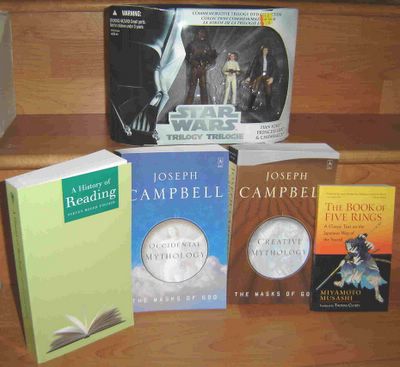New Batch of Treasures


We went to Guildford Town Centre last Thursday, February 3. At Wal-Mart, lots of toys were on SALE—spillovers from last Christmas. As always, I checked out the action-figures section; lucky, I found this Star Wars three-pack (Chewbacca, Princess Leia Organa, and Han Solo), originally priced at C$25 but was on sale for only C$5!
I used the Chapters gift card I received on my birthday to order some more books at Chapters online. After one week, the books finally arrived, in the afternoon of February 4, Friday.
1. A History of Reading by Steven Roger Fischer (2004, Reaktion Books Ltd.) – At last! I've now completed Fischer's "A History of" trilogy. In this third and final volume, Fischer "traces the complete story of reading from the time when symbols first acquired meaning through the electronic texts of the digital age. [He concludes the book] with an examination of visual language and modern theories of how reading is processed in the brain, and suggests a radical new definition of what reading truly is."
I'm already excited to ponder on this book; but, wait, I am yet to even begin the second volume, A History of Language. Besides, I'm still currently on Joseph Campbell's The Hero with a Thousand Faces and Abelardo Subido's Sonnets from a Gardener and Other Poems. I just finished reading The Good Earth by Pearl S. Buck.
2. The Masks of God Volume 3: Occidental Mythology by Joseph Campbell (1992, Penguin Books) – Another satisfaction! I'm finally complete with Campbell's The Masks of God tetralogy. In Occidental Mythology, Campbell "offers a systematic and fascinating comparison of the themes that underlie the art, worship, and literature of the Western world."
3. The Masks of God Volume 4: Creative Mythology by Joseph Campbell (1992, Penguin Books) – In this fourth and final volume of The Masks of God, Campbell "explores the whole inner story of modern culture since the Dark Ages [the period in European history between classical antiquity and the Italian Renaissance], treating modern man's unique position as the creator of his own mythology."
An American writer who specialized in the field of mythology and comparative religion, Joseph Campbell (1904–1987) said: "Read other people's myths, not those of your own religion, because you tend to interpret your own religion in terms of facts—but if you read the other ones, you begin to get the message."
4. The Book of Five Rings by Miyamoto Musashi, translated by Thomas Cleary (2005, Shambhala Publications) – If not for my longtime friend Gwyn, I would have not discovered this book at this stage.
Upon reading on my blog site that I just bought Sun Tzu's The Art of War, Gwyn readily recommended The Book of Five Rings. Immediately, I made a research about the book and its author: "...an insight on the subtle arts of confrontation and victory, analyzing the process of struggle and mastery over conflict that underlies every level of human interaction." The book is doubtlessly a complementary companion to The Art of War.
Whereas The Art of War was believed to have been authored by Sun Tzu, a mysterious Japanese warrior/philosopher who lived in sixth century BC; The Book of Five Rings was composed in 1643 by Miyamoto Musashi (1584–1645), a famous swordsman born into a samurai family.
I am yet to begin The Book of Five Rings, but I already picked up a few words of wisdom quoted from it:
1. Become acquainted with every art.
2. Know the Ways of all professions.
3. Develop intuitive judgment and understanding for everything.


0 Comments:
Post a Comment
<< Home